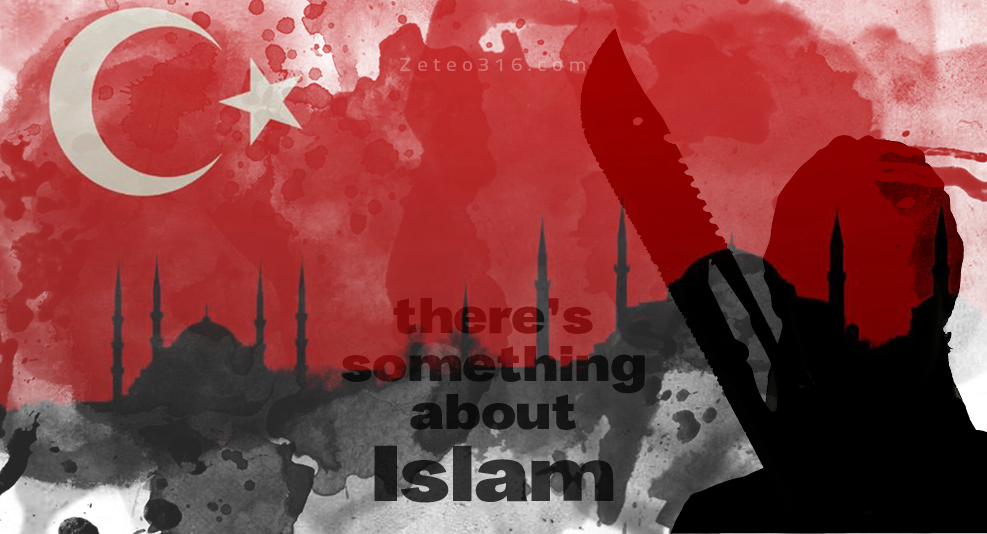
There’s something about Islam. And it isn’t good. I understand that where I’m not preaching to the choir, I’ll be duly noted as an Islamophobe. That makes me somewhat uncomfortable. However, it won’t stop me from speaking my mind.
Like many others, my curiosity about Islam deepened after the attack on the Twin Towers. Yet I wasn’t totally ignorant about Islam’s past. One really has to try very hard to walk away from Islamic history’s warning signs. There were whispers everywhere of its historical violence and subjugation of infidels.
The tragedy of 9/11 placed a spotlight on Islam. Why did it happen?
Was it America’s fault for interfering in the Middle East i.e., supporting Israel? Was it caused by desperation brought about by inequality? If we are to believe the revisionists the answer to the two last questions would be “yes.” Historical revisionists (like Karen Armstrong) began working feverishly to sanitize Islam from its violent past.
From an anecdotal perspective, I’ve often recalled when Muslim employees in an Australian motor manufacturing plant applauded the fall of the Towers. Then Prime Minister John Howard also had to order non-compliant embassies to draw their flags down to half-mast. Why was this case if Islam is fundamentally peaceful and tolerant? Believers of other faiths did not behave this way.
Australia is a tolerant and culturally inclusive country. Those who cheered were benefitting from these conditions. Why would they then applaud an attack on the West which resulted in so many deaths? My intention isn’t to demonize Muslims or embassy officials. However, these incidents are symptomatic of root issues within Islam’s teachings.
There’s another side to the 9/11 story.
Former Muslim Nabeel Qureshi (Seeking Allah, Finding Jesus) recounts how his family became concerned about possible retribution on Muslims immediately after the attack on the Towers. Notably, Qureshi’s family members weren’t closet terrorists waiting for an opportunity to pounce. His book is recommended reading for a number of reasons, not the least being to gain a more balanced perspective.
On the other hand, prominent Muslims like Ilhan Omar attempt to use 9/11 as victim currency. Secular leaders, media and churches are inclined to look the other way whenever Islamic terrorist attacks are perpetrated by Muslims. Why is this so? See David Wood’s Three Stages of Jihad and our previous article, The Global Glorification of Islam.
Islam is multi-faceted ideology, rather than just a simple faith. Government decision makers ought to be aware of its history and how Islamic regimes currently operate in respect to tolerance to non-Muslims. How is the high-influx of Muslim migrants impacting secular (mostly godless) western nations? What about the LGBTQ community in Islam? Can these two ideologies really co-exist?
But most importantly, how should Christians react to all this?
Some of the following thoughts are my own; but also informed by Erwin Lutzer’s The Cross in the Shadow of the Crescent (see especially Chapter 10).
Perhaps the first thing to note is that Muslims are just as much victims of Islamic ideology as non-Muslims are. From a Christian perspective, any system which denies Christ’s divinity (as Islam does) is demonic at its core (1 John 4:3). Hence its adherents are enslaved by it. So the nature of the conflict between Islam and Christianity is essentially spiritual.
Lutzer recommends becoming informed yet balanced regarding Islamic encroachment in communities and public schools. The Christian’s reaction ought not to be offensive e.g., burning Qur’ans in the street. Yet Christians must also be mindful of what their children are being taught – for example, the Islamic Jesus. Lutzer also advocates informed, peaceful opposition to the practice of Sharia Law.
Another thing to understand is that, even under oppressive regimes, thousands of Muslims come to faith in Christ. This is despite the fact they’re inevitably persecuted and often martyred for their faith. Iran is an excellent example of God’s sovereign work in a nation which persecutes non-Muslims. See Eugene Bach’s book Jesus in Iran.
The fact that God is sovereign in all circumstances should comfort us. We ought not to fear Islam. As Scott Oliphint rightly observes, the battle belongs to the Lord. This is what gave David confidence when he confronted Goliath.
The LORD is my light and my salvation; whom shall I fear? The LORD is the strength of my life; of whom shall I be afraid? When the wicked came against me to eat up my flesh, my enemies and foes, they stumbled and fell. Psalm 27:1-2
Erwin Lutzer writes:
We have no reason to be fearful. Rather, we can face the future with optimism because God is sovereign. He is in control. And we are in His hands, not the hands of Islam and its threats. ~ page 219
God’s Word informs us about how it all ends. Jesus Christ returns as Warrior King and delivers the kingdom to the Father (1 Cor 15:24; Phil 2:9-11; Rev 19:15). When Christ returns we shall see Him as He is, and we will become like Him (1 John 3:2). This is our confidence!
In the interim, Christians are called to be loving witnesses to all peoples. That includes Muslims, atheists, Hindus, Buddhists, and even those who would kill us. This runs contra our (mine!) natural selfish human inclinations. And this is one of the vital differences between Christianity and Islam, and the world.
There’s a prayer at the end of Erwin Lutzer’s book. The last paragraph is appropriate here:
Let the vision of Christ, who gave Himself up for us, motivate us to follow in His footsteps that we might show His love and glory to a world that lost its way. May we suffer as He suffered, love as he loved, and forgive as He forgave. To that end we submit ourselves. All for Your glory – in Jesus’ name, Amen
Maranatha!
